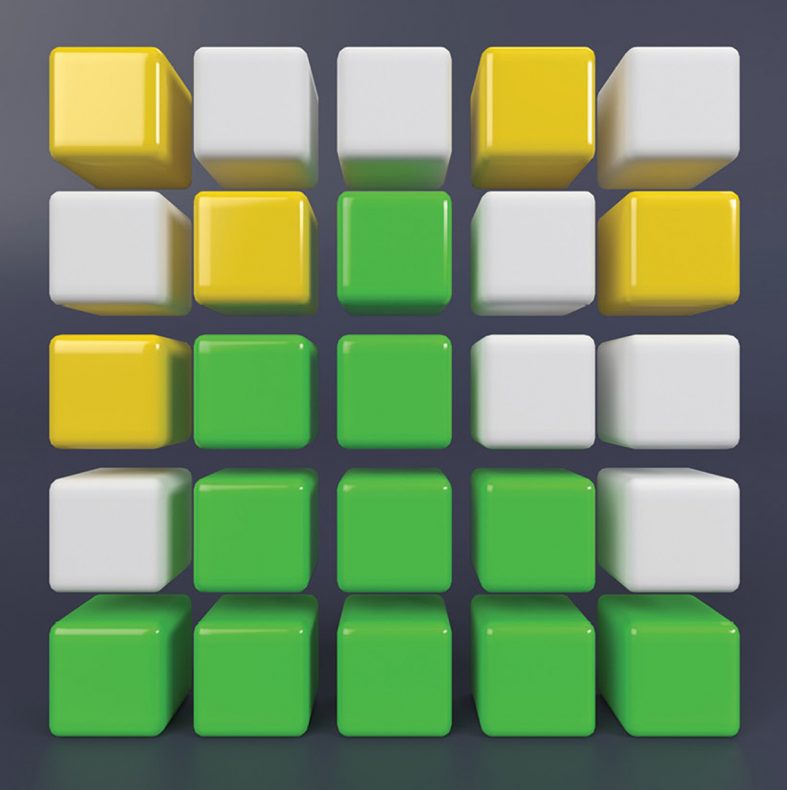Wading Into the Wordle Waters
With some trepidation, I have decided to chime in on Wordle (“An Actuary Takes on Wordle”; July/August 2022). Winning on the first word is pure luck, and no strategy can significantly increase one’s chance of winning on the second. This means that one’s initial strategy should encompass the first two words as a unit and not focus on the first word alone.
I have found the best first two words to be ADIEU and STORY, which together cover all the vowels plus four of the most common consonants. However, if ADIEU uncovers two vowels, then I change the second word to STARE, STAIR, SQUAT, SHIRE, SUPER, or SITUP as appropriate. (If ADIEU uncovers three vowels, the choices are already severely constrained.) I encourage any Wordle addicts (I mean enthusiasts) out there to give this strategy a try.
Eric Klieber
Second-Guessing
Mr. Klein poses an interesting question (Letters to the Editor, September/October 2022)—“What is the best second guess when no letters from the initial guess match?” To answer this, one has to simply calculate the information statistic for all of the words in the Wordle dictionary with no letters in the starting word. For the starting word RAISE, the top five second guesses are:
Guess Info
MULCH…..5.19
LUNCH…..5.18
CLOTH…..5.16
COULD…..5.14
CLUNG…..5.13
Mr. Klein’s choices of TOUCH and MOUND rank 31st and 42nd, respectively, with information statistics of 4.94 and 4.85.
On August 17, the New York Times calculated that SLATE was the best starting word. Here are the top five second guesses for that word.
Guess Info
CRONY…..5.57
ROUND…..5.57
GROIN…..5.46
CORNY…..5.46
IRONY…..5.46
There is an important qualification for these statistics. On August 17, The New York Times announced a change in its dictionary. Instead of basing the information statistics on its original solution list of 2,309 words that I used in my calculations, the Gray Lady now uses a list of about 4,500 words that are based on their frequency of use in the pages of the newspaper. In addition, the puzzle editors probability-weight the information statistics based on their frequency of use in the Times. As they update their dictionary and the associated probabilities, the best starting words could change.
My understanding is that the Times does not intend to make the dictionary and the probabilities available to the public. We now have to use our heads.
Al Klein responds: Thanks for sharing this response.
By the way, without the calculations, the reason I chose the words that I did were to get both O and U in the word to determine if one or both were in the word, as well as what I thought were some of the next most common letters, either the T, C, and H or M, N, and D. But now that I think of it, you probably only need one vowel because if it isn’t that one, it has to be the other. So, in your three best (after RAISE), you are testing four of the most common letters rather than the three I have been doing.
Conflict of Interest?
Today, the September/October 2022 issue of Contingencies arrived in my regular mailbox. I had already read the entire digital issue weeks ago. If we care about climate change, I suggest the default for every Contingencies subscriber should be digital only, with the option to request hard copy. Then I wondered whether the ad revenue with the hard copy was higher than it would be for a 100% digital production by more than the cost of producing and distributing the hard-copy version. If it was, would Contingencies have a conflict of interest in helping save the planet if doing so reduced its net revenue?
Jan Harrington





